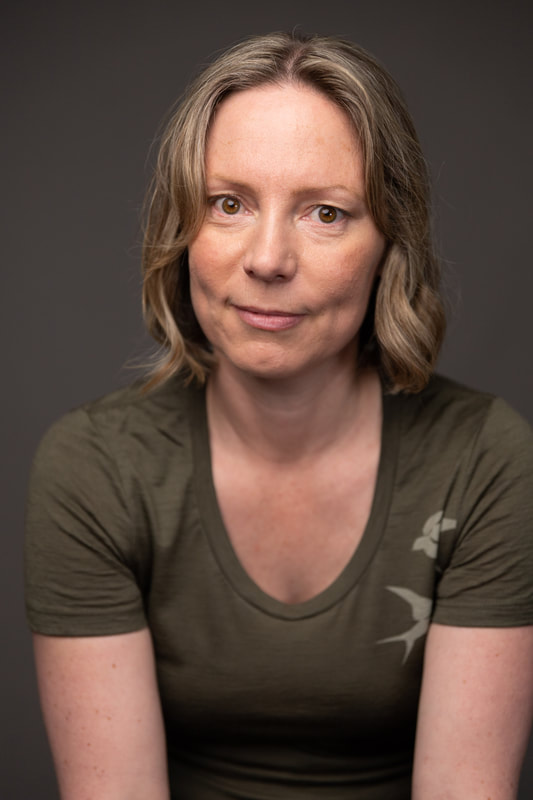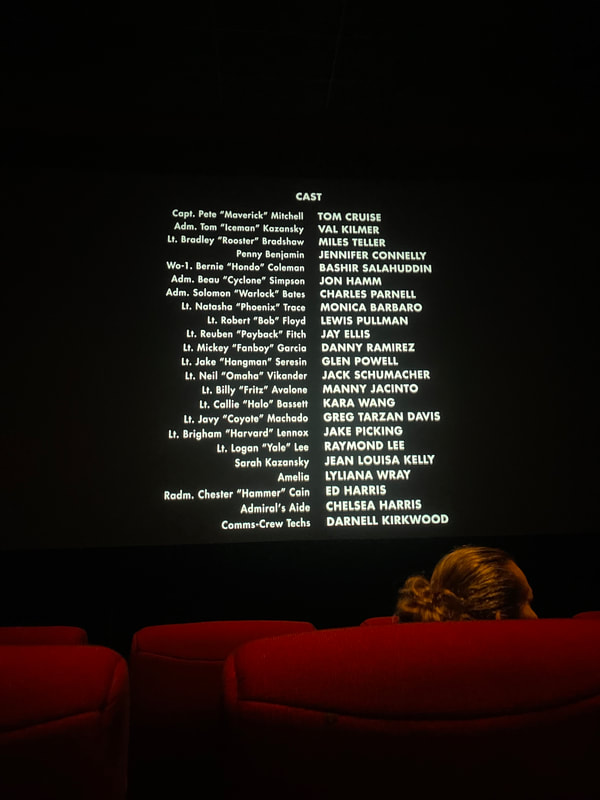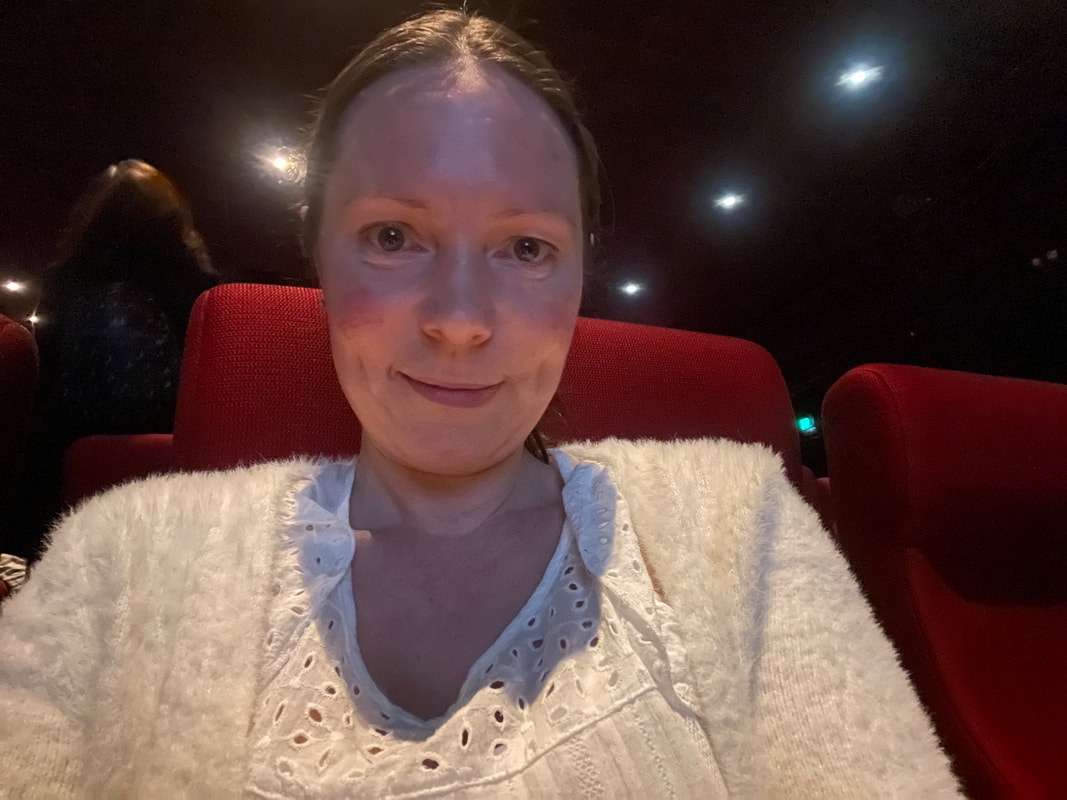But seriously, beyond the lens of professional acting & media arts, and my professional observations about all things grief and trauma, some personal reasons why I love this franchise: According to some of the real life Pilots of all genders & instructors in the main FB fan groups and their articles and podcasts, Top Gun in real life actually isn’t about recruiting only the top 1% based on performance, and in fact, machismo, rule breaking and being a “shit winner” (“nar nar neh nah neh, eg rubbing your victory in others faces) and not playing for the team, is quickly called out. And who is chosen is actually based on what skills & knowledge each can offer that best fit the current group’s needs at the time & their capacity to teach and share their knowledge at the end of their rotation. In the movie, I think this is exactly why now Top Gun Instructor, Admiral Tom Kazanski (eg “Iceman”) calls his friend, Captain Pete Mitchell (“Maverick”) back to Top Gun to have another go at teaching, after he pissed off other Admirals & got reassigned last time he was there, for not playing by the rule book. Ice, though, through the decades, still sees Mav’s potential as a brilliant Teacher, despite Mav’s doubt in his own ability as an Instructor to transfer what he knows and knows he is masterful at as a pilot. In movie 1, Mav’s doubt was, in part, a form of inherited, self fulfilling prophecy, while he still believed that his Father, pilot Duke Mitchell, was at fault and a failure in the dog fight that claimed his life, until his TG Instructor, Mike Metcalf, “Viper,” who was actually there when it happened, sets him straight on that his Dad was a hero, who saved several, by staying in the fight til the end. Yet Mav is, by movie 2, still working through forgiving himself and letting go of survivor guilt from the loss of Goose (even though the military once declared it an accident). Not to mention work through the trauma configuration typical of a kid without a parent/s; of rebellion, pushing against the boundaries, trying to find the balance of control and safety, while struggling to define and differentiate his identity and establish independence from his Dad. And the kind of not believing you’re ever enough, that leads to always going for “just a little push” more, seeking perfectionism and the validation of achieving the goal, when you didn’t have secure, stable parents who helped you believe you WERE wanted, loveable and enough, without having to over-deliver. To a kid who’s lost their parents, the adult nature of reality of a death and loss hits before they have the capacity and tools to really fully process it. But also, they tend to quickly learn that love and approval and even safety, is no longer guaranteed in the same way it is taken for granted as inevitable in securely attached 2 plus parent families. To a kid (like Mav or Bradley (Lt Bradley Bradshaw/“Rooster”/Goose and Carroll’s son) both of whom lost a parent while they were young enough to still be completely dependent for meeting their basic care needs, suddenly, you now have to behave well enough and be likeable/charismatic enough to convince people to WANT to take responsibility for providing for you and helping you grow. Until you’re old enough to go get a job and do it for yourself. Aspects of privileged family life may no longer be a guarantee. From lived experience, I can tell you this is terrifying…and you can end wishing you died too, rather than wanting to exist now feeling like a massive burden on anyone doing the caring. Let alone anxious about a parent or carers ability to meet your needs. (Welcome too, to why young Mav tries so hard to prove himself to and charm the ladies too, not just because he’s a raging, egoic narcissist, phlegmatic and carefree. Far from it. But young Mav is fully engaged in a kind of extroverted overcompensation, trying to prove that he’s enough, but not really ever believing/trusting in that, when it comes to human connection and relationships, that he IS enough.) But the fear and pain resulting from: 1) the knowledge that most people remain ignorantly blissful to until a bit later in life, that all love ultimately ends in the tremendous pain of grief associated with death, can lead to a) an intense fear of opening back up emotionally and being vulnerable in close connection and professional or personal connection of all kinds (now that you know how it ultimately ends) and b) can lead to either things like fun seeking/adrenaline seeking or escapist pursuits to try and cope with/disperse the adrenaline and anxiety and instead ‘take control’ of riding the fear c) self defence and avoidance strategies when the threat of disapproval/abandonment/endings/rejection gets too close or too much, including d) potentially self-rejecting first, before either you hurt them/let them down and/or they can see who and how you really are and potentially reject you. Over time the urge to hide one’s fear/disfunction and “not enoughness” grows as you experience more rejection of the true you. (If people can’t understand why you are the way you are by adulthood, empathy sometimes gives way to either eye rolling, or judgements about what a f#%k up, waste of space you are, like Admirals Cain and at times Simpson in TGM grilling Mav for why the hell he’s still a Captain at his age, while others are now Admirals and State Senators. Or, when there’s actual intimacy, putting up a wall of self protection against the hurt of being left unmet and hurting in reaction to wounded kids wounding still operating in the grown up, like Penny in Mav’s past and no doubt Charlie in the past) leading also to 3) a) the constant fear of the pain of rejection by potential/future surrogate family/support replacements, who don’t think you’re worth the effort/investment and this then also leads to the reinforcement of the belief and doubt about you not being enough in human relationships of all kinds b) excess hesitation of “thinking before you do” in the face of making a decision, relative to the weight of what you stand to lose through the consequences and c) then, eventually, just wanting to be up front with people about your dysfunction, to “manage expectations”, before you have a chance let down or hurt anyone else again. If Caine & Simpson cared to create enough safety to hear the real answer of why Mav is the way he is, this is what they might have noticed, or heard. Conversely, Ice, (despite all that happened in the past that could’ve driven them apart) having got the closest to Mav, being someone Mav has shown his true self to and feels safe to still confide in, and Ice, being a now great elder, friend and Instructor himself, is familiar with and has listened to and seen what it’s really like for Mav. I imagine Ice also, on some level, also probably would still feel partly responsible for helping heal things with Mav & Rooster while he sees Mav still torturing himself over it. But being first hand in it too, has compassion for Mav’s struggles, and goes all in, encouraging him to "let it go' and step up anyway, while Ice (given his throat cancer) still has time to push the point. So, coming back to how Top Gun instructors are really selected, despite Mav’s psych and performance evaluations over the years, Ice had assessed that Mav’s skills & abilities are exactly what this group of pilots need to get this job done & return alive & he knows Mav is key to “the kid’s” healing & stepping up after the loss of his parents & initial rejection to flight school. Plus that it’s key to Mav’s healing the survivor guilt from Goose, & to his wholeness to heal his connection with his “surrogate son/surrogate family” at a more personal level. IF Mav can JUST “let go” and put aside the past and all the judgements, and believe in his capacity to connect with others well, in the future. Old flame Penny Benjamin, healing and coming to understand better through seeing Mav’s vulnerability in moments like when he nearly bursts into tears at the bar door (watching Goose’s son play Great Balls of Fire on piano, from the outside now of his surrogate family looking in) seeing him offer to help her twice without pushing any agenda, after she already set the tone and boundaries of re-engagement, about “not going there again, given how it always ends”, and also listening to him open up as he navigates his way through his new assignment and ascending his wounds, Penny becomes an equal encourager friend, along with Ice, from the inside. For me, having struggled with so many of these things, looking at Mav and Rooster in particular, feels a bit like looking in a mirror. Somehow I now understand myself a little better for watching these characters navigate the same hurdles. And I do love the odd piece of art that helps you grow, heal, and feel good by the end. It is a blessing in life when you find people who’ve been through something similar and can understand you, and when you find or create your own “surrogate family”. BUT, if people don’t understand and you can’t be vulnerable and or communicate to people WHY you are the way you are, and what you need from your end, to meet/be met half way as the connection grows, some people end up writing you off as a cold, self serving narcissist , resource-sucking, toxic, lost cause, waste of their time and energy, who just does what you want, when you want, with little regard for who you trash along the way. While others endeavour to try and work you out and work with you anyway. I love that TG Maverick’s story provides an alternative viewpoint of how it REALLY is for people who lost parents young, as you try and grow and look forward. While having to unhook the lines from the parachute of the past, when you realise it’s still stuck on and tying you to a fixed point in a timeline past. Say what to you will about the machismo that Mav’s and Ice have grown through over the years, despite the loss of Goose, but Pete Mitchell, by all counts, and despite all protests, has quietly grown by TGM into a REALLY great guy. As well as one of the hero good guys. He shows up fully to every challenge. He becomes an amazingly dedicated teacher and leader, who asks all the right questions, he tries to follow the rules, but still does it his way when ‘he knows better’ than Admirals/Instructors “Cyclone” and “Warlock” what his students need to see to believe (& the Admirals later concede he got the job done of not just achieving the mission, but showing them how to come home), he never gives up and shows up as a “fill in Dad”, he’s a loyal friend and Leader, who quite literally will have everyone’s backs until the end. He shows up in love. He’s mastering a humble patience and respect of others speed of moving and growth that’s admirable. In this respect, I think he’s become one of my favourite movie characters ever. There's gold in here about healing childhood trauma, PTSD and helping Men heal through grief and loss. Dare I say it, this whole story gives me hope, in moments where I have doubted in myself, and stayed Captain, while others rose to Admiral, out of the same fears and false beliefs about not being wanted and my own inadequacies, for which “I need to manage expectations", but more to the point, manage ME, every time I love and live again. And makes me want to step back up as a Teacher, in my own ways in which I’m not always sure how to teach what others might also say I’m masterful at. In the age of disposable work and personal relationships, stories about loyalty, not leaving your wing person and having each other’s backs through all forms of challenge, really count for something. The love and loyalty and camaraderie (& trauma bonds, in that there’s a certain type/depth of closeness that builds specifically during crisis and adversity) between Mav & Ice, decades later after Mav & Goose, the healing journey between Mav and Bradley, ‘as family’ and the reconciliation of Mav & Penny, as he heals his demons, is inspiring and a source of hope, aspiration and clearly a source of resonance for many. The very idea of Mav & Ice and Rooster & Hangman, and then all the other pilots, being able to grow through the challenges, to work as teams and become a close team of Wingpeople, who have each others backs until the literal near, or actual ends of their lives, is a beautiful example of teamwork and leadership we can all aspire to, as we all face relatable culture challenges, across many other industries and areas of life. According to the female real life fighter pilots too, who report that the Women are often an example of ‘doing it right’, compared to the bits of machismo that get weeded out, Phoenix too (who Maverick, as Team Leader on the mission, selects from the squad as his Wing Woman, along with Rooster and Coyote) is also a brilliant example of how female pilots really do act as a balancing, unifying force, within such teams in real life.
Nat xx |
WriterActress, Artist, Singer, Coach, Facilitator, Speaker, Writer Nat Ferrier talks about self expression, Women’s Leadership Mindset & communicating with greater confidence, presence & psychological safety. Archives
March 2024
Categories |



 RSS Feed
RSS Feed